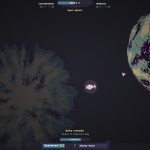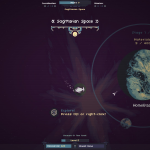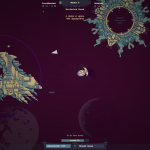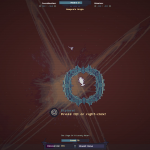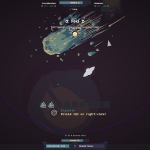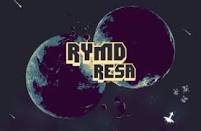 My handwritten notes on RymdResa are all questions, or contain statements framed by questions: “Is this surreal or not? The mechanics are grounded, but context is not.” And after 9 hours of play, I’m left with more questions. Who is the protagonists long-lost love? Is she a metaphor for something? Is the protagonist the player? Is he multiple protagonists? What exactly are his goals?
My handwritten notes on RymdResa are all questions, or contain statements framed by questions: “Is this surreal or not? The mechanics are grounded, but context is not.” And after 9 hours of play, I’m left with more questions. Who is the protagonists long-lost love? Is she a metaphor for something? Is the protagonist the player? Is he multiple protagonists? What exactly are his goals?
I kept going back, more times than I should have, hoping to find some answers, but the game’s poetry doesn’t provide answers, it provides more questions. There’s nothing wrong with that in itself, but ambiguity is a tricky thing, and I feel like RymdResa handles it poorly.
The mechanics are dead simple, or at least the gameplay vocabulary is straightforward. “Resources” encompass ship integrity, fuel, and, well, resources – used for exchanging with other civilizations, attempting risky missions, or pretty much anything. It’s all very streamlined and unified, so any fears that RymdResa is an overcomplex mess of micromanagement can be laid to rest. Then there are Spacepoints, which carry over after death, and can be used to purchase more powerful ships for the next run.
It describes itself as a roguelike, but it doesn’t feel like a Roguelike, at least not in any of the ways that word connotes. It’s never exactly tense. You keep all your items and mission progress(except the first chapter’s progress), so the only thing that’s lost is your ship and your position in the universe. At most, you may feel cautious when low on resources, but if you keep your speed low it’s not difficult to survive.
As an exploration game, it’s more successful. You can interact with any non-enemy that enters the foreground, and all of these objects are varied and well-drawn. Sometime’s it’s a resource reward, sometime’s it’s a reward/penalty with a text description, and often it’s a choice, which is usually binary, and based on a text description.
The problem here is the game’s reward structure is completely random. Even encountering identical choices, there is a right/wrong choice, but it’s randomized every time. Sometimes flying through an asteroid field with autopilot is the right choice, but sometimes flying through an asteroid field manually is the right choice. Sometimes mining resources will fail and the game will chide you about disturbing the purity of the planet, but sometimes you’ll get your resources and life goes on.
RymdResa has findable items and equipment, but I think there’s a conflict here, between the relaxing, “experiential” elements of procedurally-generated zone names, colours, and encounters, and the exciting stat-based elements of a new engine, shield, or ship style. If you’re like me, you’ll check your inventory every time, and investigate that new item for your ship, and it’s a constant battle between the long, lonely voyage into space, and the quest for Spacepoints and “phat loot”. It breaks the flow of solemn solitary space voyages, which are very relaxing for long stretches of empty space.
If the game has a philosophical thesis, it feels like it’s nihilism. Or maybe it’s that there is no meaning in space. The protagonist has a poem that says:
Empirical
evidence,
please lead
my way.
What are we supposed to make of this? The game’s distribution of points seems entirely arbitrary! What empirical evidence is there? Exploring an asteroid can lead to a Spacepoint and Resource penalty, and other times it can reward you!
On the topic of the poetry, I’m going to get a little highfalutin’ here, because I was Majoring in English during my time in University, and this isn’t great poetry. Maybe it’s a language-gap thing, because these developers are Swedish, but it doesn’t present clear themes, aesthetics, or use of rhythm or verse. Poetry in games is woefully underused, and only rarely is it good(shoutout to Starseed Pilgrim!), but here it’s absolutely central, and I’m not exactly impressed.
So our protagonist is depressed and lonely, but he’s got a mission, apparently. We’re never told what that mission is, but if they tie in to the game objectives, they are to start a settlement and explore nether-space. But we never get any sense that he’s satisfied with these objectives at any point, and even finishing the game just brings up a cutscene of stitched-together clips of previous poetry. The final words of the game’s ending:
In that moment I saw everything
very clearly;
there is corruption
in this universe.
In playing the game, I constantly felt like I was missing a piece of the puzzle. Maybe I would discover one more piece of our protagonist’s space poetry, and suddenly everything would come together? That moment never came; I’m left with more questions than answers. At least the music is nice.
Gameplay
Graphics
Sound
Overall

